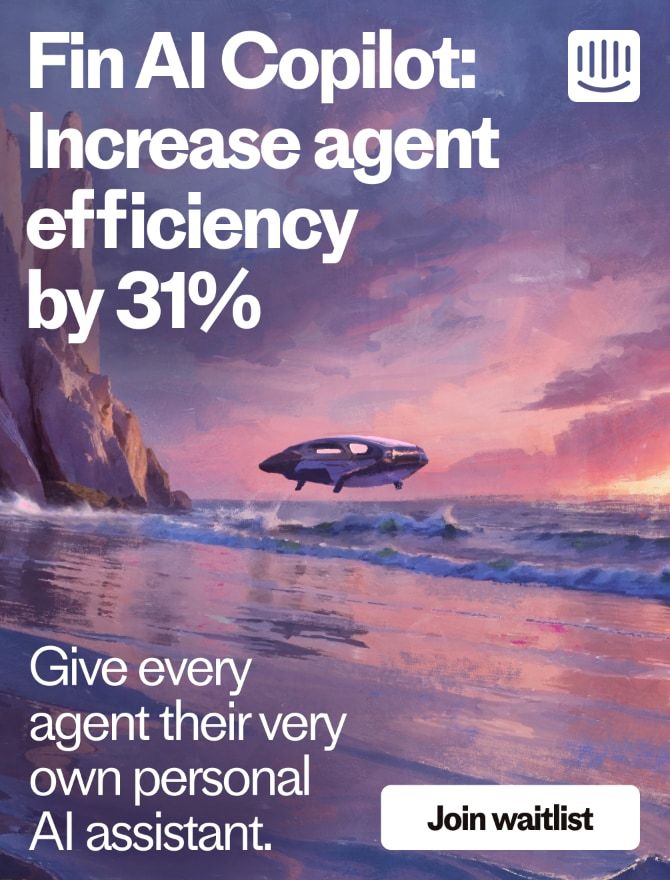
How to ask your customers great questions and gather actionable feedback – 3 key takeaways
We recently hosted the debut session of our CX for Growth webinar series, with guests Great Question.
CX for Growth is a webinar series hosted by the Startups team at Intercom, a casual, interview-style monthly session featuring special guests and exploring customer experience topics that help to drive growth in your business.
Great Question is an all-in-one customer research platform that makes it easy to build a panel of customers, schedule research studies (surveys, interviews and prototype tests), send incentives, and synthesize and share insights. Gathering every aspect of the research process in one place allows companies to include the voice of their customers in every decision.
Founder Ned Dwyer and Head of Customer Success Sarah Cunningham-Scharf at Great Question sat down with me and Éabha O’Sullivan, our Customer Advocacy Specialist, to discuss how you can ask your customers great questions and gather actionable feedback.
“First-party data has never been more crucial for building lasting customer relationships and engagement”
We at Intercom are firm believers in the power of feedback and with third-party cookies becoming a thing of the past, first-party data has never been more crucial for building lasting customer relationships and engagement. So grab a coffee and settle in as we dive into the three main takeaways from this discussion.
What did we learn?
- How to bake in a process and culture of customer feedback.
- Scalable customer feedback approaches.
- How to identify your customer advocates and become their biggest supporters.
How to bake in a process and culture of customer feedback
We’re major advocates for collecting real-time data. Getting information at the time of the issue is so valuable, as people tend to forget things or the experience can be skewed the longer they spend reflecting on it. Capturing those moments as they happen provides really powerful feedback, and using tools such as Surveys not only makes this data collection possible, it makes it simple.
Plus, as third-party cookies become a thing of the past, first-party data is going to be crucial for businesses to really build lasting relationships with their customers.
“Feedback needs to be disseminated throughout the business – to different, relevant teams who can take action on it”
As well as surveys, reviews are a really good opportunity to get powerful data and information that you wouldn’t get on a day-to-day basis. Responding to reviews is essential for showing your customers you value their thoughts, but actions speak louder words.
That feedback needs to be disseminated throughout the business – to different, relevant teams who can take action on it. At Intercom, our Customer Advocacy team aims to read every review, responds to as many as possible, and shares that information with the necessary teams who can drive developments and improvements. Even negative feedback or a bad review provides an opportunity to take action and turn that customer into your biggest advocate. If someone is complaining, they probably care about you – if you can turn that around by showing them you care too, you can create a powerful long-term advocate.
“A recent example we had was with slower load times with Intercom. Our Advocacy team brought it to our RAD team, who had also seen it come up in the NPS. They then had two strong data points to escalate the issue and action improvements.”
Eabha O’Sullivan, Customer Advocacy Specialist at Intercom
Every piece of feedback should be treated as guidance for the company direction to make sure the voice of the customer is front and center throughout the product roadmap. This can be easier in small teams, but it is important to start with that mindset and advocate for the customer in every decision so they become your biggest supporters.
Long story short – consider live, in-context feedback a gift from your customer and take every measure to act on it.
Scalable customer feedback approaches
Research democratization is a key customer feedback approach for scaling businesses – it’s all about empowering teams across your organization to create and consume user research insights and make more informed decisions. So, it’s important to give them the tools and resources to make them more effective at that and make sure they’re doing things in the right way to get high quality insights they can share with the team.
“HoneyBook is a customer of ours that has done a great job at this. They have done it by co-opting members of their customer support and customer success teams, saying, ‘Look, this is the initiative that we’re trying to understand right now. Here’s an interview guide. Can you please go out, find 10 customers, here are some parameters.’ And they’ll go out there and farm their customers to inform what’s ultimately going to happen on the product roadmap.”
Ned Dwyer, Founder at Great Question
Personalizing outreach can be difficult to get right as your business grows – but it is crucial for generating and maintaining engagement. So how can you be personal with the customer feedback that you’re gathering but also zoom out and work at a larger scale?
“In terms of the scale side of things, one of the big outputs that we have in terms of customer feedback is our customer evidence. One way that we have tried to scale is by taking that process and breaking it down and trying to figure out how we could make this easier and where we could take people’s involvement, like from the relationships team. In some instances, we send out a questionnaire directly to the customers and we get some feedback through that as well. So it was just looking at ways that we could do this on a bigger scale”
Eabha O’Sullivan, Customer Advocacy Specialist at Intercom
If you give everyone the tools and resources to make them more effective at gathering, analyzing, and actioning insights that can be shared across your organization. The overall quality of your output will improve, resulting in happier customers, as well as happier teammates.
Identify your customer advocates and become their biggest supporters
Start from the ground up with the mindset of being your customer’s advocate in everything that you do. If you bake that feedback into your decisions, then eventually they will become your biggest advocates – put customer insights at the center of all product, design, and marketing decisions, and have this principle drive everything that you do.
Great Question offers the easiest way for people to build a panel of customers that want to participate in research, find the right method to run that research, answer the big questions, share what you learned with your team – and do that in an all-in-one tool.
Sarah shares how Great Question identifies top advocates and how to approach building relationships that elevate customer stories:
“From a data mining perspective, your advocates will be the people that are living and breathing your tool. These ‘power users’ are likely to be your biggest advocates because that means they’re seeing value. But, there are also people that you form more of a personal relationship with, where if they provide a piece of constructive feedback saying, ‘Hey, this feature would operate better if it looked like this, instead of the way it is right now.’ It’s listening to them and letting them know we want that kind of constructive feedback so that we can iterate over time and continue to meet customer needs. When they feel heard and we act on their feedback, it makes them want to stick around longer.”
Sarah Cunningham-Scharf , Head of Customer Success at Great Question
Businesses should ensure there is value for the customer in providing this feedback – once they feel heard and that you actually care about what they have to say, that’s when you can really find that customer advocate that will scream and shout about your brand. And if people aren’t responding to things like questionnaires, the best way to make them feel seen and heard is personalizing that outreach.
“If someone’s giving you their time, you should give them something back”
Leverage your CSMs to send those personal notes and say, “Hey, saw you’ve done this in the product recently. Any thoughts on it, want to hop on a quick call?” You can even take that personal touch one step further and incentivize this engagement. If someone’s giving you their time, you should give them something back, so incentives are a great way to show customers just how much you value their time and opinions. It can also make it easier to get feedback from customers who don’t want to talk to you. This is an important mechanism to get a holistic view of public perception so you can make changes that are all-encompassing.
What final advice does Great Question have for businesses?
- Start with defining the question: What are you trying to understand from your customers? Is it about how satisfied they are in general? If so, net promoter score or CSAT is the way to go. But if it’s a bigger question of trying to understand what customers’ challenges are, then maybe a customer discovery interview would be more fitting.
- Just start: Don’t worry about making the perfect process or writing the perfect customer interview guide. The process of improvement never ends so just start and keep reviewing and reflecting on it.
- Create value for your team too: Share with the team what you’re learning and over time they’re quickly going to understand how valuable it is – how it’s going to save them time and money and ultimately build better products.
- Contact the right people at the right time: Make sure that you’re only contacting eligible candidates and that you’re aligned on how frequently you reach out to avoid spamming customers.
- Make it easy for them to say yes and no: Make it easy for them to schedule time with you by sending them a link or a survey. But, also make it easy for them to say no. Don’t put any expectations on them or be too pushy. Otherwise, you’ll damage the relationship.
Simplicity is the key to success
First-party data holds the key to successful customer engagement, so companies need to make it as simple as possible to gather information from customers in a meaningful way, share that data with other teams, and incite action. Democratizing customer research will set your teams up for success and empower you to incorporate the voice of the customer in everything you do.
Thanks to Great Question for being an Intercom customer and for sharing their time and insights. If you need help building or revising your customer research approach, get in touch with Great Question to learn more about their all-in-one customer research platform.
Stay tuned for our CX For Growth webinar series – designed for startups. Sign up here and join our monthly chats with special guests talking about customer experience topics that will help drive growth in your business.
If you are an early-stage startup looking into getting started with Intercom, apply to the early-stage program and get 95% discount on your first year with Intercom.







